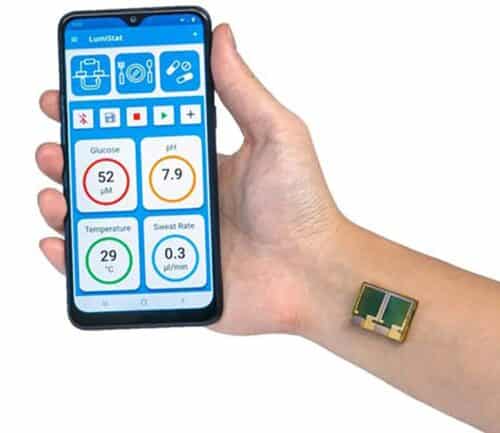Caltech researchers discovered a wearable health technology with solar-powered sweat sensors.

A new generation of solar-powered wearable sweat sensors developed at California Institute of Technology (Caltech), USA offers a promising tool for continuous, non-invasive health monitoring. The sensors designed by Wei Gao, professor and the director of the Gao research group, Caltech utilise perovskite solar cells to operate without the need for batteries, making them ideal for continuous health tracking in both outdoor and indoor environments. The technology is expected to be useful for a wide range of users, including athletes, individuals with chronic health conditions, and those who require frequent health monitoring, such as people with diabetes or cardiovascular diseases.
The wearable devices are capable of detecting various biomarkers in sweat, such as salts, glucose, and even complex molecules like C-reactive protein, a marker for certain health conditions. Wei Gao has been working for five years on enhancing these sensors. His latest innovation, developed in collaboration with Martin Kaltenbrunner, professor, head of the soft matter physics division, Johannes Kepler University, Austria ensures that these sensors can be powered by ambient light, without the need for external energy sources.
Perovskite solar cells are the key to the sensor’s design, offering higher efficiency compared to traditional silicon cells. “We care about more real-life conditions, including normal office and home lighting,” said Gao. The new flexible perovskite solar cell achieves power conversion efficiency exceeding 31 percent under indoor lighting, which is far more suitable for everyday conditions than earlier models that required strong sunlight.
The sensors are also designed to be lightweight and comfortable for long-term wear. Unlike previous versions powered by bulky lithium-ion batteries, these new sensors rely on the lightweight and efficient solar cell, ensuring that they can run continuously for up to 12 hours a day. The devices can monitor a range of health indicators, such as pH, salt, glucose, and temperature, and can provide real-time data via a Bluetooth-connected mobile app.
These sensors not only provide continuous health monitoring but also have significant economic and clinical potential. With the ability to customise the sensors for specific biomarkers, they can be produced at low costs, making them a viable diagnostic tool for global health management, especially in underserved regions.







